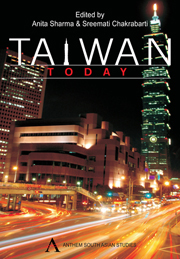Book contents
- Frontmatter
- Contents
- Acknowledgements
- Contributors to this Volume
- Acronyms and Abbreviations
- Foreword
- Introduction
- 1 Who are We? Identity in Transition
- 2 Taiwan: Yearning for an Identity
- 3 The Implications of Direct Flights: Beijing in Taiwanese Politics
- 4 Kuomintang, Democratization and the One-China Principle
- 5 The Deepening and Consolidation of Democracy in Taiwan
- 6 India and Taiwan: Bolstering Complementarity in Information Technology
- 7 Asian Regional Economic Integration and Taiwan–India Economic Relations
- 8 The Taiwan Factor in Sino–Indian Relations
- 9 Japan's Triumphant Diplomacy in Taiwan in 1874
- 10 A Study of the Cultural and Educational Exchanges between Taiwan and India, 1995–2006
- 11 Between Two Worlds: A Survey of Education in Taiwan
- 12 Female Immigrants, Social Capital and Public Sphere in Taiwan
- 13 Information Technology and Gender: Taiwan and India
- 14 Tzu Chi: A Case Study of Engaged Buddhism in Taiwan
- 15 Master Hsing Yun of Fo Guang Shan and the Development of Humanistic Buddhism
- 16 The Heritage and Innovation of Chan Paintings in Taiwan
- 17 Taiwan in World Architecture: A Historical Perspective
- Afterword
15 - Master Hsing Yun of Fo Guang Shan and the Development of Humanistic Buddhism
Published online by Cambridge University Press: 05 March 2012
- Frontmatter
- Contents
- Acknowledgements
- Contributors to this Volume
- Acronyms and Abbreviations
- Foreword
- Introduction
- 1 Who are We? Identity in Transition
- 2 Taiwan: Yearning for an Identity
- 3 The Implications of Direct Flights: Beijing in Taiwanese Politics
- 4 Kuomintang, Democratization and the One-China Principle
- 5 The Deepening and Consolidation of Democracy in Taiwan
- 6 India and Taiwan: Bolstering Complementarity in Information Technology
- 7 Asian Regional Economic Integration and Taiwan–India Economic Relations
- 8 The Taiwan Factor in Sino–Indian Relations
- 9 Japan's Triumphant Diplomacy in Taiwan in 1874
- 10 A Study of the Cultural and Educational Exchanges between Taiwan and India, 1995–2006
- 11 Between Two Worlds: A Survey of Education in Taiwan
- 12 Female Immigrants, Social Capital and Public Sphere in Taiwan
- 13 Information Technology and Gender: Taiwan and India
- 14 Tzu Chi: A Case Study of Engaged Buddhism in Taiwan
- 15 Master Hsing Yun of Fo Guang Shan and the Development of Humanistic Buddhism
- 16 The Heritage and Innovation of Chan Paintings in Taiwan
- 17 Taiwan in World Architecture: A Historical Perspective
- Afterword
Summary
INTRODUCTION
Humanism has been defined as the faith in the supreme value of self-perfectibility of human personality. However, it broadly indicates shifting focus from supernaturalism to naturalism, from transcendental to the existing, from absolute reality to the living reality. Buddhism is the practice of peaceful and compassionate humanity. It is a religion of compassion, humanity and egalitarianism. Among world religions, probably Buddhism has the greatest humanistic claim. In Buddhism, humanism is that attitude of mind, which attaches primary importance to human beings.
The term Humanistic Buddhism (HB) was first coined by Venerable Tai Xu and adopted by Master Hsing Yun. Its primary goal is to lead to the Bodhisattva practice, i.e. to be an energetic, enlightened and endearing person who strives to help sentient beings liberate themselves. HB is the practical interpretation of theoretical Buddhism and focuses on issues of the world, caring for the living, benefiting others and universal salvation and application of wisdom that has been realized so far.
The Fo Guang Shan (Buddha Light Mountain) Buddhist Order, which was founded by the Master Hsing Yun, is dedicated to the development of HB. His leadership turned the idea of HB into the universal movement.
THE CONCEPT OF HUMANISM
Humanism has been defined in various ways. It is a contemporary belief calling itself religious but substituting faith in man for faith in god. Similarly, humanism is also explained as the faith in the supreme value of self-perfectibility of human personality.
- Type
- Chapter
- Information
- Taiwan Today , pp. 205 - 217Publisher: Anthem PressPrint publication year: 2010



